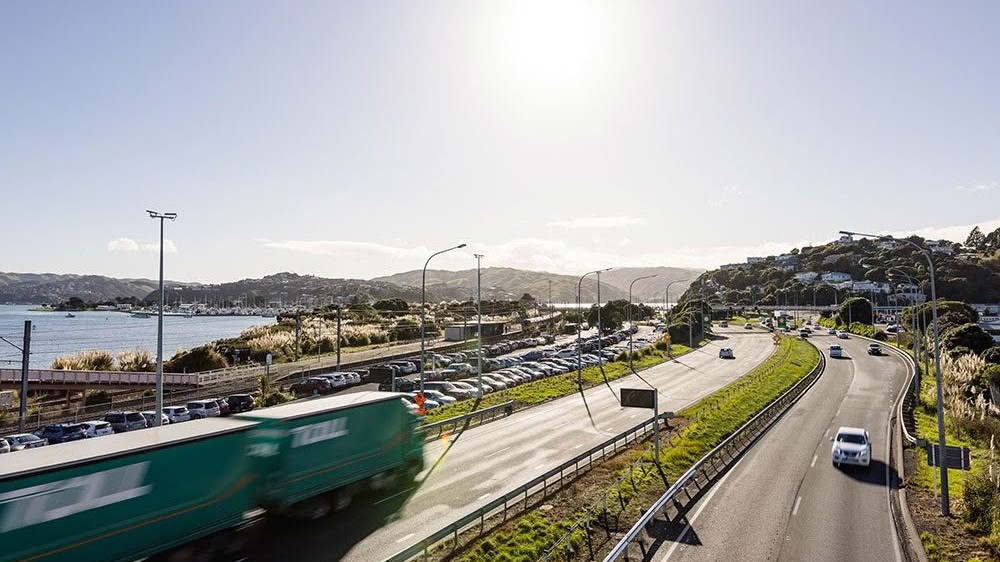Govt unveils $2.68bn for transport, associations comment

The government has announced a $2.68 billion investment in roads, rail, and public transport as part of Budget 2024, as it looks to “unlock economic growth and enable Kiwis and freight to get to where they want to go quickly and safely”.
Transport Minister Simeon Brown said the funding includes a billion-dollar increase over that signalled during the consultation on the GPS on land transport. This funding has been secured to accelerate the delivery of priority projects including the Roads of National Significance.
“We want construction firms to know that this government will get on and build roads and we have prioritised funding in place to make this happen,” Brown said.

“Investing in transport infrastructure is critical to our plan to rebuild the economy so we can lift incomes and afford the health, education, and other frontline services New Zealanders depend upon.”
Other transport investments in Budget 2024 include:
- $1.0 billion to accelerate the delivery of the Roads of National Significance and major public transport projects.
- $939.3 million to repair roads damaged by last year’s severe weather events in the North Island
- $266.9 million to upgrade and maintain the metropolitan rail networks in Auckland and Wellington
- $200 million to support KiwiRail to carry out maintenance and renewals on the national rail network
- $10 million for Airways New Zealand to complete the minimum operating network of Ground Based Navigation Aids
- $44 million to support the Civil Aviation Authority to carry out core functions while fee and levy rates are under review
- $23.1 million to support critical frontline rescue services to respond to severe weather events and emergencies
- $63.6 million to support Surf Life Saving New Zealand and Coastguard New Zealand
- refocusing $59.7 million of existing funding over the next four years towards decarbonising the bus fleet, including zero emissions buses and charging infrastructure, and improvements to bus driver safety and working environments.
This investment builds upon the $20.7 billion in funding already outlined this year in the draft GPS on land transport and Roads of Regional Significance programme to boost investment in roading, rail, and public transport to ensure Kiwis can get where they need to go quickly and safely, including:
- 17 Roads of National Significance and major public transport projects
- $500 million for a Pothole Prevention Fund
- Supporting the procurement of new trains for the Wellington-Wairarapa and Wellington-Manawatū lines
- 10 Roads of Regional Significance
“Budget 2024 delivers a clear pipeline of transport infrastructure investment which will support our plan to rebuild the New Zealand economy,” said Brown.
“Budget 2024 is also about ensuring we continue to repair and rebuild the important transport links that were knocked out during the North Island weather events.
“The Government is fully funding the recovery of the State Highway network and supporting local councils with the recovery.”
Industry associations Transporting New Zealand and National Road Carriers have welcomed the Budget announcement.
“Roads in New Zealand have been desperately underfunded for decades so new investment in highways, including national and regional roads of significance, is desperately needed,” said Transport New Zealand interim chief executive Dom Kalasih.
“Kiwis can’t continue to put up with deteriorating roads that are jeopardising economic growth, which is vital for the community and businesses.”
Kalasih said road transport operators are reporting low demand and increasingly tough economic conditions.
“Transporting New Zealand is hearing from many members who have seen revenue drop significantly over the past few months. Many trucking firms haven’t seen the traditional post-Christmas uptick in business, with bulk and aggregate and logging operators some of the worst affected,” he said.
Kalasih said he is confident the road freight industry will navigate the difficult economic conditions, as they have with previous challenges.
“Over the past few years, we’ve seen road freight operators successfully deal with the COVID pandemic and severe pressures on the supply chain, acute driver shortages and cost pressures, and now the dual challenges of an economic recession and continued inflationary pressure. Things are tough, but road freight firms are very resilient.”
Justin Tighe-Umbers, CEO, National Road Carriers, said: “Yesterday’s budget was everything National promised. A balance between re-prioritisation and targeted investment in the areas New Zealanders have been calling for – 1.9 million households are going to benefit from the promised tax relief and critical services such as health and education are ear marked for significant investment.
“This Government appreciates that if we are to unlock our economic potential and stimulate growth investment in roading infrastructure is key. This Budget is rightly looking at what investment needs to happen in the short term to set us up for success in the long term. When it comes to freight and ensuring New Zealanders have the products they need it, when they need them roading is critical.”
“The reality of New Zealand’s topography, scale and disparate population is that every mode needs road. Intermodal transport solutions must work together to create efficiencies and increase productivity, so it is pleasing to see rail is also being prioritised in terms of funding as it is a key part of the freight mix.”
Tighe-Umbers said NRC is continuing to call on officials make sure roading infrastructure is supported by a 50-year plan. “A strong pipeline will promote investment, build resilience in the network, and gives contractors the confidence to invest in their people, technologies and engineering solutions that will further enhance the quality of the network.
“For our members this increased investment in roading infrastructure means they can look forward to roads that are better maintained, repaired quicker and ultimately safer,” concludes Tighe-Umbers. “And when the road is your workplace, that definitely counts as a positive.”





